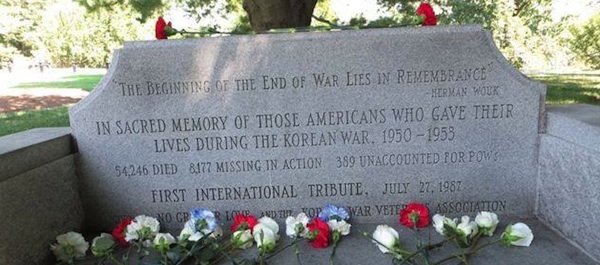
July 27, 2013, marks the 60th anniversary of the negotiated armistice that ended hostilities in the Korean War, a war that began June 25, 1950, when communist North Korea invaded democratic South Korea. It was a war that claimed an estimated five million casualties, the vast majority of them civilians. To honor American and South Korean service personnel and those of 20 other nations that aided South Korea in maintaining its independence, many events have been held during the anniversary, coordinated by the Department of Defense 60th Anniversary of the Korean War Commemoration Committee, that the valor shown in the so-called “Forgotten War” will not be forgotten.
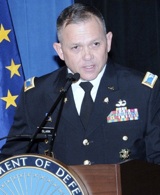 Colonel David J. Clark of the U.S. Army was selected to head that committee. Colonel Clark assumed command of the 524th Military Intelligence Battalion in Seoul, Korea, in 2001, following assignments with the 88th Field Artillery Detachment in Greece and serving in the Military Intelligence Corps with the 24th Infantry Division, the Supreme Headquarters Allied Powers Europe (SHAPE), the US Army JFK Special Warfare Center and School, and the US Special Operations Command. He returned to Korea in 2007 to serve on the USFK J2 staff before being assigned as the Director, Analysis and Production, CJ2 Multi-National Force – Iraq. Currently, he serves on the Army Staff as the Director of Foreign Intelligence, Army G2 at the Pentagon.
Colonel David J. Clark of the U.S. Army was selected to head that committee. Colonel Clark assumed command of the 524th Military Intelligence Battalion in Seoul, Korea, in 2001, following assignments with the 88th Field Artillery Detachment in Greece and serving in the Military Intelligence Corps with the 24th Infantry Division, the Supreme Headquarters Allied Powers Europe (SHAPE), the US Army JFK Special Warfare Center and School, and the US Special Operations Command. He returned to Korea in 2007 to serve on the USFK J2 staff before being assigned as the Director, Analysis and Production, CJ2 Multi-National Force – Iraq. Currently, he serves on the Army Staff as the Director of Foreign Intelligence, Army G2 at the Pentagon.
In September 2012, Colonel Clark spoke with our partner site, Armchair General, about the activities of the Korean War 60th Anniversary Committee. With the anniversary of the armistice approaching, World History Group asked the colonel for an interview on HistoryNet, to bring us up to date on the committee’s activities.
HistoryNet: Colonel Clark, would you give us an overview of some of the events and activities of the 60th anniversary that have taken place since the observance began?
Colonel David J. Clark: We always talk about the three pillars of our mission. First, to honor the courage and sacrifice of our Korean War veterans and their families, especially those who gave the ultimate sacrifice; second, to preserve history, to make sure people are aware of the history, both the battles and the technology; and finally, to educate the broader America public about why the war was important. It reshaped Northeast Asia and set the groundwork for today’s vibrant South Korea and a generally peaceful and prosperous Northeast Asia.
We’ve traveled all over the U.S. and staged events in over 40 states. It’s been a team effort. Our committee isn’t very large, only about 15 people. Some are active duty, some are Department of the Army civilians, and some are contractors. What we’ve been able to set up with veterans and veterans organizations in individual states is what made it possible for us to do all we’ve done. They handle the administrative details of setting up a site, contacting the media, etc. There are Korean War veterans everywhere in the U.S., so we hope to reach all 50 states before the anniversary officially ends on September 30.
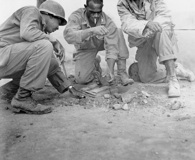 One thing we hoped to do was to highlight some elements of the Korean War not shown during earlier anniversaries and some things that weren’t emphasized at the end of the war. One was the diversity of troops who served. The war came on the heels of President Harry Truman’s order that opened the door to integrating the military (Executive Order No. 9981, issued July 26, 1948). At the beginning of the war, many of the units were segregated; by the end of the war, all were integrated. The Department of Defense (DoD) has monthly observances – Hispanic Heritage Month, Asian-Pacific Islanders Month, etc. We try to highlight a group that served in the Korean War during its month.
One thing we hoped to do was to highlight some elements of the Korean War not shown during earlier anniversaries and some things that weren’t emphasized at the end of the war. One was the diversity of troops who served. The war came on the heels of President Harry Truman’s order that opened the door to integrating the military (Executive Order No. 9981, issued July 26, 1948). At the beginning of the war, many of the units were segregated; by the end of the war, all were integrated. The Department of Defense (DoD) has monthly observances – Hispanic Heritage Month, Asian-Pacific Islanders Month, etc. We try to highlight a group that served in the Korean War during its month.
We’ve also tried to honor the allied nations that sent combat or support troops as part of the United Nations effort. We went to France to honor the French Battalion and to Canada to recognize Princess Patricia’s Canadian Light Infantry. We’ve done some ceremonies in the Washington, DC, area with the Norwegian Embassy to honor the Norwegian MASH units and with the Ethiopian Embassy to recognize Ethiopian units. And of course, there is the Republic of Korea, whose soldiers paid such a high price in that war.
HN: There is a special display on the Korean War set to open at the Pentagon on the 18th, isn’t there?
Col. Clark: Yes, there is going to be a permanent exhibit on the Korean War that will be part of the Pentagon’s official tour. There’s never been an exhibit devoted exclusively to the Korean War there before. It will be state of the art, with a video wall continuously showing videos and images. Special panels will be devoted to each of the services—Air Force, Army, Marine, Navy, Merchant Marine and Coast Guard—and it will also acknowledge the Allied contributions. Secretary of Defense (Chuck) Hagel will cut the ribbon and be the keynote speaker. What’s great about this is that when the anniversary is over, this is one of the legacy projects that will remain.
HN: On July 27, a special event is being held at the Korean War Veterans Memorial in Washington, DC, to observe the anniversary of the armistice that concluded hostilities. Would you tell us a bit about what is planned?
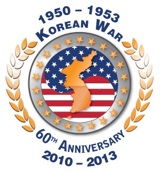 Col. Clark: That’s the major culminating event of our activities, though there will be some events in August and September. This will be the major event bringing our commemoration to a close. Secretary Hagel will be there; the president has been invited, and we’re hopeful he will be able to accept our invitation. Thousands of Korean War veterans are coming to the event from all over the country, and there will be representatives from the allied nations. The event is open to the public, and we’re hoping for large turnout. This is really our last opportunity as a nation to say thank you to the Korean War veterans. Their average age is 82–83. This may be the last major milestone many of them will be able to attend, so it is very important to do this to honor them and their families.
Col. Clark: That’s the major culminating event of our activities, though there will be some events in August and September. This will be the major event bringing our commemoration to a close. Secretary Hagel will be there; the president has been invited, and we’re hopeful he will be able to accept our invitation. Thousands of Korean War veterans are coming to the event from all over the country, and there will be representatives from the allied nations. The event is open to the public, and we’re hoping for large turnout. This is really our last opportunity as a nation to say thank you to the Korean War veterans. Their average age is 82–83. This may be the last major milestone many of them will be able to attend, so it is very important to do this to honor them and their families.
This isn’t just an observation of the ending of hostilities. It also marks the beginning of Republic of Korea-United States military alliance, one of most successful military alliances in U.S. history. It set the stage for Korea’s development. In many ways it was as important as Marshall Plan was to Europe following World War II. It allowed the Republic of Korea to prosper and take its place among the major nations of the world. ROK troops made it possible to maintain the peace in Northeast Asia, and they have participated in numerous deployments around the world. ROK troops not only participated in the Vietnam War, but also took part in Iraq and Afghanistan and the rescue and relief efforts in Haiti. The alliance still remains strong.
HN: In your interview with Armchair General, you said that all of the 22 nations that contributed troops to aid South Korea in the war will play a prominent role in the culminating event this July 27th. Is that happening, and if so, what will be their roles?
Col. Clark: We have extended invitations to each nation that contributed combat or support troops, and we expect there will be a representative from each nation. Each nation will be able to place a wreath in front of their country’s maker at the Korean War Memorial, where each of the allied nations has a marker. It will be quite poignant.
Of course, the Republic of Korea will have representatives there. In addition to the ambassador and defense military attaché, we are anticipating a very senior executive is going to fly to the U.S.
The morning of the 27th will begin with pre-program entertainment and videos shown on large displays while people are being seated, between 8 and 10 a.m. The official program begins at 10:00 and will end at approximately 11:30.
HN: Actually, there is at least one event scheduled after July 27, isn’t there—a commemoration of the prisoners of war exchange?
Col. Clark: There will be a commemorative ceremony in Korea; they do this annually to commemorate what they call the Big Switch and the Little Switch, the prisoner exchanges at the end of the war. It is a very emotional period. The POW exchanges were the time when many families learned the fate of their loved ones. The vigil still continues for some families whose members never came home. The current situation on the ground makes efforts to gain access to where the fallen remain is very difficult at this time, so this is a bittersweet anniversary that remains very emotional to this day. We felt it was a very important event to highlight as part of the program.
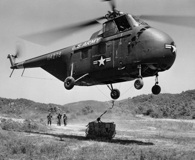 We have a good Website that veterans and others can visit to learn more about what we’re doing and view photos from past events. It also has some great historical tabs that give chronology and key events, broken down by service arms. The site will be maintained in perpetuity so historians, family members and veterans can continue to visit. We can’t get everywhere, but the Website allows people to virtually visit and see what we’ve been doing, even if we can’t get to them in person.
We have a good Website that veterans and others can visit to learn more about what we’re doing and view photos from past events. It also has some great historical tabs that give chronology and key events, broken down by service arms. The site will be maintained in perpetuity so historians, family members and veterans can continue to visit. We can’t get everywhere, but the Website allows people to virtually visit and see what we’ve been doing, even if we can’t get to them in person.
When we visit the states and hold events honoring veterans, we present them with certificates of appreciation signed by Secretary Hagel. We get lists from local Korean War veteran organizations and present these certificates to each individual veteran. You’d be surprised what a piece of paper means to these guys. It is more than a piece of paper to them—it means their government recognizes what they did, and we are very honored to give it to them.
HN: On a personal level, what has meant the most to you during the time you’ve served as head of the DoD’s Korean War 60th Anniversary committee?
Col. Clark: I’ve got to tell you I’ve been on active duty for over 30 years now, and this is the greatest duty I’ve ever had. I’ve met veterans from every corner of the country and heard stories of just humbling heroism, of comradeship between men, and heartbreaking stories of loss. I feel privileged to have served in this role. I’ve taken away a lot more than I’ve given back. It’s made a great impression on me. I think I can speak for all of our team and say the same is true for each of them. To hear these stories is priceless.
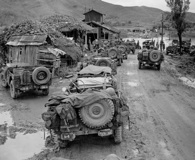 I try to tell these guys, too, just how much we owe them. When I was a young officer serving in 24th Infantry Division, we were weaned on stories of Chosin Reservoir. That was our inspiration. I tell them, “We stand on your shoulders. You are our heroes.”
I try to tell these guys, too, just how much we owe them. When I was a young officer serving in 24th Infantry Division, we were weaned on stories of Chosin Reservoir. That was our inspiration. I tell them, “We stand on your shoulders. You are our heroes.”
I think they are kind of surprised to hear that. They didn’t come home to the fanfare World War II veterans got, but they shrugged their shoulders and got on with their lives, with building America. They never realized what a great contribution they made, that their sacrifices were not in vain and they have an enduring legacy they can look back on with pride.
HN: What do you hope the legacy of the committee’s activities will be?
Col. Clark: I hope at the end of the day that public awareness of the Korean War and its continued importance will have been raised. Even if it is temporal, that is still worthwhile. We’re trying to spark awareness and interest in the descendants of Korean War veterans. We hope they’ll want to read and learn more about it, because it isn’t a subject that is significantly covered in schools. If we’ve raised the bar even a little bit in three years, I’ll consider that a positive outcome.
I tell veterans, “We know you know the story of the Korean War. We want to make sure your children and grandchildren know, so that it won’t go to the grave with you.”
We’ve worked with the Library of Congress’ Veterans History Project to try to capture more of the oral histories. We’ve managed to obtain a number of oral histories that will forever be on file as a resource to the American people.
HN: Thank you for taking time to talk with us. Is there anything you’d like to add in closing?
Col Clark: I hope in some small way we’ve made a difference to America’s veterans, that they realize their government realizes we owe them a debt that can never be repaid for what they did on the Korean Peninsula 60 years ago.




